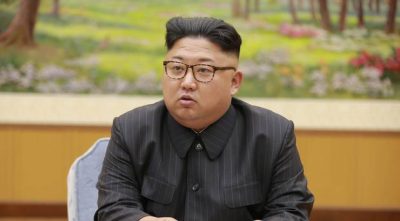Washington’s Draft UN Security Council Resolution on North Korea

VISIT MY NEW WEB SITE: stephenlendman.org (Home – Stephen Lendman). Contact at [email protected].
Security Council resolutions targeting North Korea are counterproductive, achieving nothing other than heightening tensions more than already – Washington’s reason for wanting them imposed, opposing engaging with its officials diplomatically.
In its current form, a draft US sponsored SC resolution on the DPRK is unacceptable to Russia and China, calling for:
- an asset freeze and travel ban on Kim Jong-un and other designated DPRK officials;
- designating additional “WMD-related items,” including specified materials, equipment, goods and technology;
- designating “conventional arms dual-use and munitions” and related items, including specified materials, equipment, goods, and technology;
- designating vessels used to transport coal, its purchase by other countries prohibited;
- authorizing UN member states to interdict and inspect North Korean vessels at sea in international waters;
- banning exports of crude oil, condensate, refined petroleum products and natural gas to the DPRK;
- prohibiting textile exports to the country;
- preventing illicit (sic) DPRK coal exports through Rajin;
- banning the hiring and use of North Korean workers by other countries; and
- prohibiting joint ventures and cooperative economic activities with Pyongyang, among other measures.
The resolution claimed “the importance of maintaining peace and stability on the Korean peninsula…through dialogue” Washington opposes.
A Monday vote on the resolution is planned. Sergey Lavrov told Rex Tillerson Russia will only accept one calling for diplomacy involving all relevant parties, saying:
Moscow’s position calls for use of “political and diplomatic tools to seek peaceful ways of resolution.” It opposes escalation of tensions on the peninsula.
The Kremlin rejects suspending oil shipments to the DPRK. Spokesman Dmitry Peskov stressed the importance of constructive dialogue with Pyongyang, the only way to deal with contentious issues.
Putin said
“cutting off the oil supply to North Korea may harm people in hospitals or other ordinary citizens.”
China’s Foreign Minister Wang Yi earlier called sanctions counterproductive, stressing the importance of diplomacy over hardline policies.
Moscow and Beijing may agree to further sanctions less harsh than Washington wants imposed. They oppose measures risking collapse of North Korea’s economy. In its current form, the US draft resolution won’t pass.
Washington bears responsibility for heightened regional tensions – a pretext for further militarizing the Korean peninsula, along with increasing the presence of US warships in East Asian waters and warplanes in its airspace, provocative actions, polar opposite responsible policies.
VISIT MY NEW WEB SITE: stephenlendman.org (Home – Stephen Lendman). Contact at [email protected].
My newest book as editor and contributor is titled “Flashpoint in Ukraine: How the US Drive for Hegemony Risks WW III.”Sour
http://www.claritypress.com/LendmanIII.html
Listen to cutting-edge discussions with distinguished guests on the Progressive Radio News Hour on the Progressive Radio Network.
The Globalization of War: America’s “Long War” against Humanity
by Michel Chossudovsky
The Globalization of War includes chapters on North Korea, Ukraine, Palestine, Libya, Iran, Yugoslavia, Haiti, Syria and Iraq as well as several chapters on the dangers of Nuclear War including Michel Chossudovsky’s Conversations with Fidel Castro entitled “Nuclear War and the Future of Humanity”.
According to Fidel: “in the case of a nuclear war, the ‘collateral damage’ would be the life of all humanity”.
The book concludes with two chapters focussing on “Reversing the Tide of War”.
“The Globalization of War” is diplomatic dynamite – and the fuse is burning rapidly.”
ISBN Number: 978-0-9737147-6-0
- Pages: 240 Pages
List Price: $22.95
Order directly from Global Research
Special Price: $15.00
 America’s hegemonic project in the post 9/11 era is the “Globalization of War” whereby the U.S.-NATO military machine —coupled with covert intelligence operations, economic sanctions and the thrust of “regime change”— is deployed in all major regions of the world. The threat of pre-emptive nuclear war is also used to black-mail countries into submission.
America’s hegemonic project in the post 9/11 era is the “Globalization of War” whereby the U.S.-NATO military machine —coupled with covert intelligence operations, economic sanctions and the thrust of “regime change”— is deployed in all major regions of the world. The threat of pre-emptive nuclear war is also used to black-mail countries into submission.
Conversations on the Dangers of Nuclear War: Fidel Castro and Michel Chossudovsky, Havana, October 2010
This “Long War against Humanity” is carried out at the height of the most serious economic crisis in modern history.
It is intimately related to a process of global financial restructuring, which has resulted in the collapse of national economies and the impoverishment of large sectors of the World population.
The ultimate objective is World conquest under the cloak of “human rights” and “Western democracy”.
Order directly from Global Research
REVIEWS:
“Professor Michel Chossudovsky is the most realistic of all foreign policy commentators. He is a model of integrity in analysis, his book provides an honest appraisal of the extreme danger that U.S. hegemonic neoconservatism poses to life on earth.”
Dr. Paul Craig Roberts, former Assistant Secretary of the U.S. Treasury
““The Globalization of War” comprises war on two fronts: those countries that can either be “bought” or destabilized. In other cases, insurrection, riots and wars are used to solicit U.S. military intervention. Michel Chossudovsky’s book is a must read for anyone who prefers peace and hope to perpetual war, death, dislocation and despair.”
Hon. Paul Hellyer, former Canadian Minister of National Defence
“Michel Chossudovsky describes globalization as a hegemonic weapon that empowers the financial elites and enslaves 99 percent of the world’s population.
“The Globalization of War” is diplomatic dynamite – and the fuse is burning rapidly.”
Michael Carmichael, President, the Planetary Movement
Michel Chossudovsky is an award-winning author, Professor of Economics, Founder and Director of the Centre for Research on Globalization (CRG)


